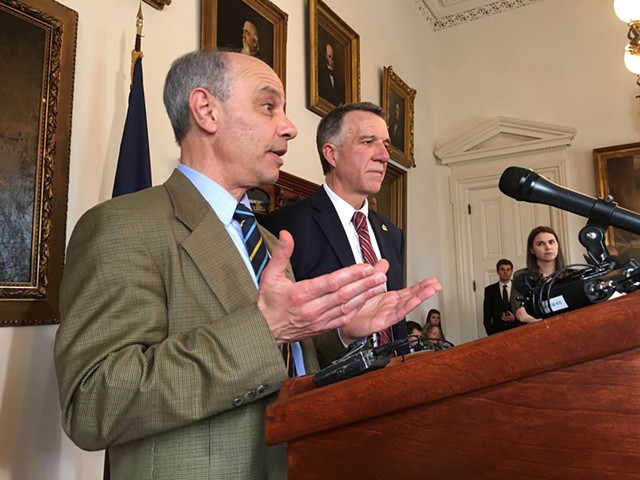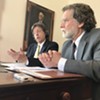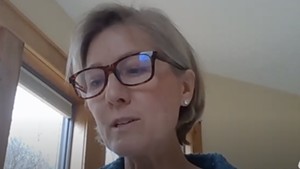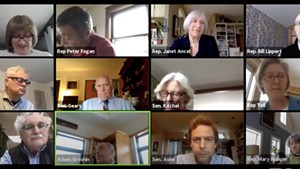
- File: John Walters
- Finance Commissioner Adam Greshin and Gov. Phil Scott
Though the coronavirus pandemic has
blown a hole in Vermont's state budget, Gov. Phil Scott's administration believes it can close out the current fiscal year without major cuts to government programs.
In
a presentation to the House Appropriations Committee on Monday, Finance Commissioner Adam Greshin outlined
the administration's proposal to address a nearly $195 million deficit in the state's General Fund brought on by the public health crisis. The plan largely relies upon borrowing $138 million from the state's reserve funds — and then paying the money back early next fiscal year.
"We're well aware there will be some challenges in [next year's] budget, so we thought we would take it light this year," Greshin told committee members. "And the good news is, we were able to do that."
While the legislature typically passes a "budget adjustment act" halfway through the fiscal year to accommodate unexpected changes in revenue and spending, it is now embarking upon a highly unusual process of crafting a
second budget adjustment two months before the fiscal year ends on June 30. The administration's proposal on Monday was the first step in that process. The House and the Senate are now expected to come up with their own plans.
The $195 million General Fund deficit includes $48 million in expected revenue that is lost for good due to the economic shock caused by the pandemic, Greshin said. It also includes nearly $143 million in deferred revenue that the state still expects to receive, but not until next fiscal year. The deferrals are largely the result of the federal government's decision to bump income tax due dates from April 15 to July 15.
The good news, Greshin told committee members, is that state finances were in relatively good shape prior to the pandemic, which he said would minimize the pain — at least for now. "We've come out of this year with the wind at our back," he said. "If there were a time to go into this crisis, this would be the time to do it."
The administration's plan to close the $195 million General Fund gap includes two components. The first is to draw down $138 million from the state's various reserve funds, which are currently worth $224 million. Those funds would be refilled later this summer as income tax receipts finally arrive.
The administration would close the remaining $56 million gap with a hodgepodge of sources. The biggest is a $38 million influx in Medicaid funding provided to the state by the second of four federal coronavirus relief packages. The state is also benefiting from an almost $9 million reduction in Medicaid payments prompted by a slowdown in general medical services.
"Despite the fact that we're in a full-blown health care crisis, the usage of health care, you might say, is down sharply," Greshin explained, calling it a "bizarre side effect of the COVID-19 crisis."
Another unexpected boon to the state? Booze. The administration is expecting an additional $4.6 million worth of alcohol tax revenue this year. "I think many people are aware that there's been, for better or for worse, an increase in the consumption of liquor, spirits during the crisis, and thus that has made available to us some additional revenue through the Department of Liquor and Lottery," Greshin said.
The administration's budget adjustment proposal does not account for the $1.25 billion the state recently received through the Coronavirus Relief Fund, which was made possible by the third federal relief package, known as the CARES Act. That money comes with restrictions disallowing its use to balance state budgets. The executive and legislative branches
are currently haggling over how to appropriate those funds.
Even as lawmakers make changes to this year's budget, they also expect to begin writing a so-called "skinny budget" governing the first quarter of the 2021 fiscal year, which begins July 1. Greshin said Monday that he hopes to present a plan for that budget within weeks.

















Comments
Comments are closed.
From 2014-2020, Seven Days allowed readers to comment on all stories posted on our website. While we've appreciated the suggestions and insights, right now Seven Days is prioritizing our core mission — producing high-quality, responsible local journalism — over moderating online debates between readers.
To criticize, correct or praise our reporting, please send us a letter to the editor or send us a tip. We’ll check it out and report the results.
Online comments may return when we have better tech tools for managing them. Thanks for reading.